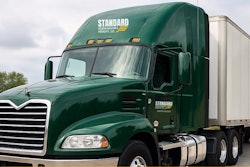The great debate on Mexican trucks this month appears headed for a heated conclusion – at least for 2001 – as Congress returns from its month-long August recess. The debate will center in the Senate, which approved legislation just before the recess that would subject Mexican trucks to a series of tough requirements before allowing them into the interior of the country. That legislation was contained in an appropriations bill funding the activities of the Department of Transportation for fiscal 2002.
The measure brought a veto warning from the White House, which earlier this year committed the United States to open the country to the Mexicans under the North American Free Trade Agreement by January 1, 2002. But with the resumption of the debate, the border opening might be delayed. The White House warning followed another presidential veto threat over a companion House bill, that contained an outright ban on the border opening throughout the fiscal year, which begins on October 1.
A day after the Senate vote, Mexican president Vicente Fox also warned that Mexico would bar U.S. trucks from operating south of the border until his country’s trucks are allowed into the United States.
The likelihood of a full-blown resumption of the debate grew as opponents and proponents of the border opening made no attempt to reconcile their differences.
“Both sides seem to be digging in their heels,” said one trucking lobbyist. “Nothing is happening,” added a Senate aide.
Twenty-two conditions
The Senate on August 1 approved the $60 billion appropriations bill with an amendment by Senators Patty Murray (D-Wash.) and Richard Shelby (R-Ala.) that would impose 22 conditions on the movement of Mexican trucks beyond the border-area commercial zones in which they now operate. The vote came after the Senate voted 100-0 to shut off debate on the bill.
Those restrictions would require full on-site safety compliance reviews on carriers prior to gaining operating authority, the installation of stationary scales and weigh-in-motion devices at all border crossings, and the insurance of all carriers by U.S.-licensed insurers. They would also adopt the so-called “California plan” under which Mexican vehicles must display a valid Commercial Vehicle Safety Alliance inspection decal, and be reinspected at least every 90 days (when the decals expire).
The bill requires the DOT’s Inspector General to certify that sufficient new border inspectors have been hired and trained. The IG also would have to certify that the Federal Motor Carrier Safety Administration can assure compliance with U.S. safety regulations and that Mexican data sources are adequate to assure the flow of needed information to U.S. authorities.
In addition, FMCSA would have to complete rulemaking on a number of regulations mandated by the 1999 law that created the agency, plus a regulation that bars Mexican trucks from crossing the border unless an inspector is on duty.
The Senate approved the bill after rejecting an amendment by Senator John McCain (R-Ariz.), the ranking Republican on the Senate Commerce Committee. McCain called for less drastic restrictions, including a requirement for briefer safety reviews rather than the compliance reviews of the Murray version, and scrapping the dual weight equipment requirement. Under that amendment, the FMCSA rulemaking requirement could be waived, and several others would be scaled back or scrapped.
Filibuster threat
McCain vowed to continue to fight in September in a bid to wear down the bill’s proponents and make them more amenable to a compromise.
“I remind my colleagues,” he said on the floor after the bill was approved “that there are three more cloture votes that may be required which will all involve, of course, extended debate. I do not want to do that. But, if necessary, we will continue through until finality.” Cloture is the process by which the Senate kills a filibuster, but it’s often difficult to achieve because it requires 60 votes.
McCain could force debate on three procedures needed to select members to represent the Senate in the joint conference with the House to resolve differences between both chambers’ version of the DOT funding bill. The ensuing 30 hours of debate could so tie up the Senate, McCain hopes, that his opponents would agree to negotiate.
Extended debate could threaten to leave the DOT without funding, if work on the bill is not finished when the new fiscal year begins next month. In that case, both houses could approve a continuing resolution, continuing funding at fiscal 2001 levels until new funding is approved. Such a move would strip the department of the $88 million in new funding the administration requested to hire border inspectors and start building new inspection facilities. Without that money, it is questionable whether the border could be open in time to meet President Bush’s target.
A presidential veto could, ironically, have the same impact, because it would also delay the added funds.









